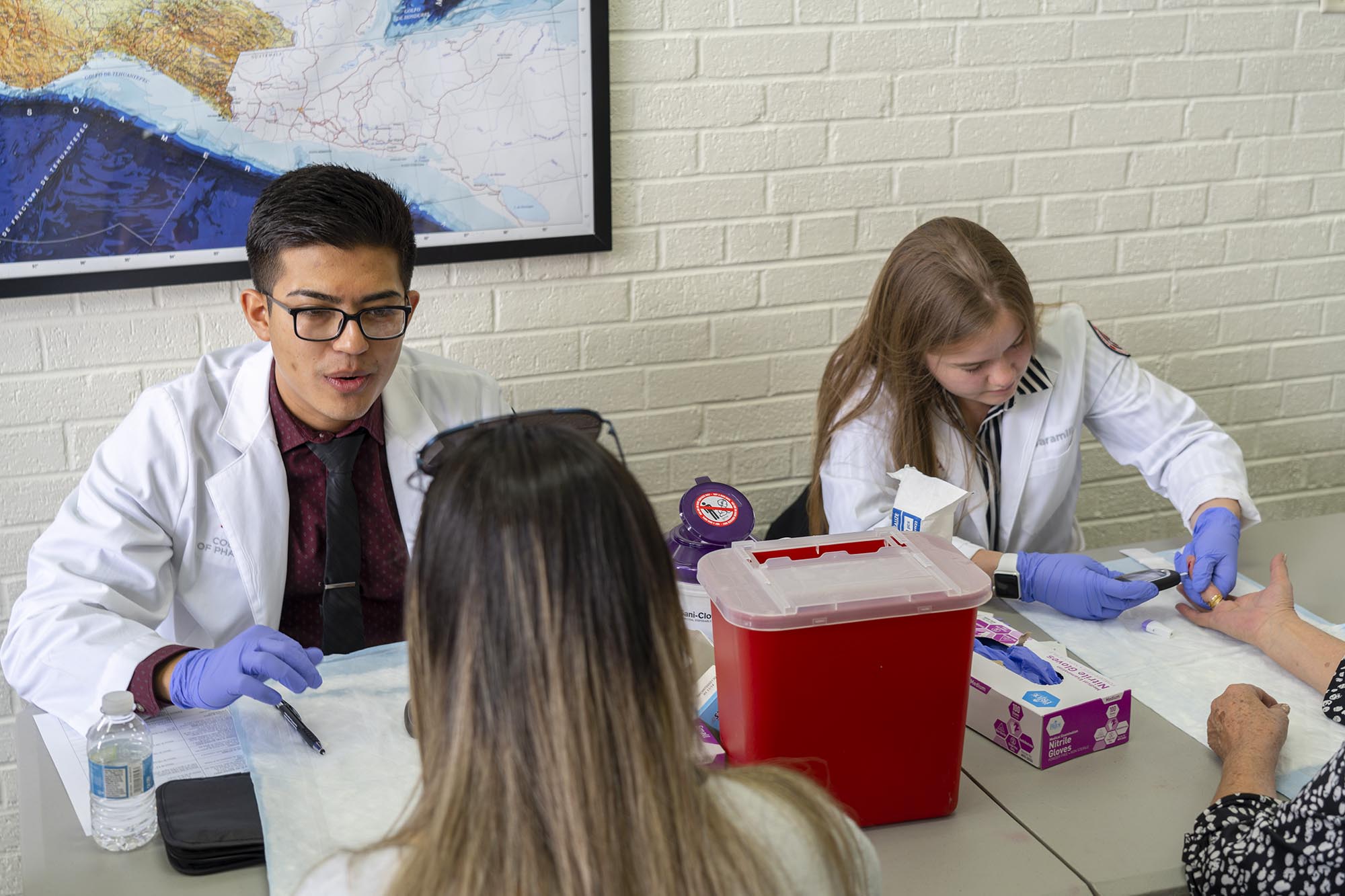Are you ready to become a leader in pharmacy? Apply today to become part of a pharmacy movement beating in the heart of New Mexico.
 (505)-272-3241
(505)-272-3241

During your time at the University of New Mexico College of Pharmacy, you’ll build a wide range of practical and professional skills as you pursue a Doctor of Pharmacy degree. Apply your abilities in real-world settings during pharmacy rotations.
The following are the required competencies and skills you'll develop while earning your PharmD degree.
Design, document, implement, monitor, evaluate, and adjust an individualized evidence-based, pharmaceutical care plan that will ensure patient safety and optimal therapeutic outcomes.
1.1 Develop, assess, implement, and/or monitor an individualized patient care plan to achieve the desired therapeutic outcomes for treatment of a disease or disorder with measurable and achievable therapeutic goals. CAPE 1.1, 2.1, 3.1
1.2 Select the appropriate drug product formulation and route of administration to design, monitor, and/or modify individualized treatment regimen(s) using pharmacokinetic, pharmacodynamics, and/or pharmacogenomic data. CAPE 1.1, 2.1, 3.1
1.3 Prepare/ compound, dispense, and/or administer safe and effective pharmaceutical products. CAPE 2.2
1.4 Perform activities for which the New Mexico Board of Pharmacy grants specific prescriptive authority certification. CAPE 3.2, 3.3
Promote wellness, disease prevention, management of medical conditions, and reduction of health disparities through education, advocacy, and other activities at the population and individual patient levels.
2.1 Educate the public and other healthcare providers regarding health and wellness; prevention and treatment of diseases, medical conditions, adverse drug events; and optimal use of medications, medical devices, natural products and nutritional supplements. CAPE 2.3, 2.4, 3.2. 3.3, 3.5
2.2 Participate in health policy decision-making processes based on analysis of epidemiologic and pharmacoeconomic data, patient access to care, medication use criteria, and medication review and risk-reduction strategies. CAPE 4.2, 4.3
2.3 Participate in the development and provision of collaborative & interprofessional services to prevent, detect, and manage disease and optimize patient outcomes through effective drug management. CAPE 3.4, 3.5
Participate in the management of systems that promote and control safe, accurate, efficient, timely and cost-effective distribution of medications and related devices.
3.1 Participate in the use and evaluation of systems to identify and prevent potential medication misuse, medication errors and adverse drug events. CAPE 3.1, 4.3
3.2 Discuss pharmacoeconomic principles and health-related quality-of-life concepts to improve patient care and allocation of health care resources. CAPE 3.3, 3.5
3.3 Review, interpret and apply practice guidelines and medication use policy in accordance with a defined health care plan, program, or system. CAPE 3.3, 4.4
3.4 Provide safe, cost-effective, quality patient care using appropriate resource management practices. CAPE 3.1, 3.3, 4.3
3.5 Utilize electronic resources to optimize accurate, appropriate, and timely delivery of medication and services. (CPOE, EHR) CAPE 2.2
4.1 Use information technology systems to retrieve data and literature to assist in drug information provision, patient care, drug distribution, patient safety, and compensation. CAPE 2.2, 3.1, 4.3
4.2 Interpret, evaluate, and apply information from primary literature as well as secondary and tertiary resources to effectively manage patient care. CAPE 1.1, 2.2, 3.1, 4.3
Demonstrate effective communication, collaboration, and interpersonal skills for effective information exchange and team work with patients, caregivers, prescribers and other healthcare providers.
5.1 Use oral, written, and multimedia skills to communicate effectively with patients, prescribers, other health professionals, caregivers, and members of the community. CAPE 3.6, 4.1, 4.4
5.2 Demonstrate sensitivity and responsiveness to culture, diversity, and identity in all communications. CAPE 3.3, 3.5
5.3 Cooperate, collaborate, and communicate with interprofessional teams to insure that healthcare is integrated, continuous, and reliable. CAPE 4, 1.2
Demonstrate the attributes of a professional, including a commitment to, and accountability for, carrying out professional responsibilities, maintaining professional competence, and adhering to legal and ethical principles.
6.1 Demonstrate the traits and tenets of professionalism. CAPE 4.1, 4.2, 4.4
6.2 Acquire and maintain personal and professional development through ongoing self-directed learning and reflection. CAPE 4.1
6.3 Engage in innovative activities by using creative thinking to envision better ways of accomplishing professional goals. CAPE 4.3
Office of Student Affairs
Nursing/Pharmacy Building, Suite 188
College of Pharmacy
ATTN: Student Affairs
MSC09 5360
1 University of New Mexico
Albuquerque, NM 87131-0001